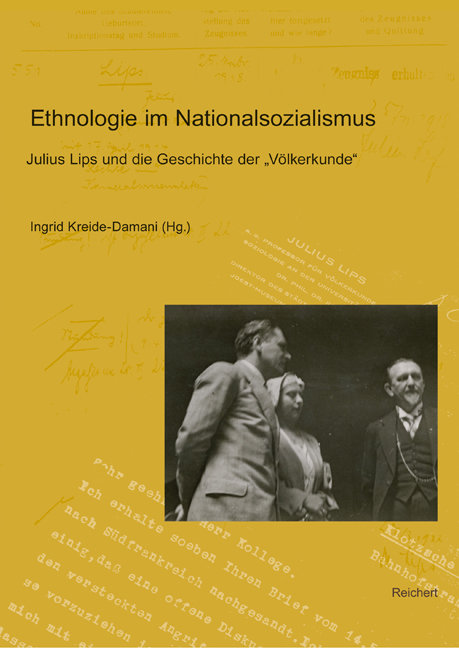When in November 1933 the American anthropologist Leslie Spears responded to a letter by Martin Heydrich, editor of the German academic journal Ethnologischer Anzeiger , he stated quite clearly:
With many colleagues in the United States, I share the feeling that we cannot cooperate with German enterprises at the present time. We feel that so long as the present rulers of Germany hold their antisocial course, and so long as anthropology there is made to serve malicious political ends, we can only hold ourselves aloof. When the day arrives that Germans are willing to admit freedom of thought and action, as every nation calling itself civilized must, then I shall be happy to join you in your enterprise.
By November 1933 Julius E. Lips, social democrat, director of the Rautenstrauch-Joest Museum of Anthropology and professor at the University of Cologne, had already been stripped of his positions by the rulers of the Third Reich. The following year, Lips emigrated to the USA. To finance his passage to New York he signed a contract for a book which was published in Britain and the United States in 1937. The Savage Hits Back became an international sucess as an instrument of anti-Nazi propaganda not least pushed by the sucess of Savage Symphony , a personal description of the takeover of power in Cologne by the Nazi-regime, which was published by Julius Lips´ wife Eva in 1938. Working for the anti-Hitler coalition in their American exile, Julius and Eva Lips became U.S. citizens in 1942. Six years later, the couple returned to Leipzig in the Soviet-occupied zone of post-war Germany (then not yet divided into two states), where Julius Lips - by the intervention of Heinrich Mann - became head of the university´s department of anthropology. Elected president of the university in 1949, Julius Lips suddenly died in 1950.
Meanwhile, the former curator of the Völkerkunde und Tierkunde Museums in Dresden, Martin Heydrich, functionary member of the NSDAP in Nazi uniform, had laid the groundwork for a career which lifted him into the director´s chair of the department of anthropology of the University of Cologne founded in 1940 and handed him the directorship of the Cologne Rautenstrauch-Joest Museum of Anthropology. In 1949, after four years of denazification, he was able to continue his career unabated, even his involvment in judgements on racial matters on behalf of the Nazi Party´s Office of Racial Policy was swept aside by the cold war. Soon Heydrich had become one of the figureheads of German anthropology once again. Research into the involvement of German anthropology in the Third Reich and the active part it played with regard to the racist ideology of the Nazis was not started before 1990, when Heydrich´s generation had passed away.
The volume at hand sets out to contribute to this research and to answer open questions concerning Julius Lips´ life and so far unattended academic work. New facts appeared among a part of yet unpublished documents by and on Martin Heydrich held in the Historical Archives of the City of Cologne. These documents, inaccessible before, revealed hithero unknown internal connections and networks as well as national and international forms of organisation within the field casting new light on the role played by German anthropologists before, during and after the Nazi period.
As it turned out, this attempt at presenting you with a rudimentary lay-out for a yet unwritten history of the German Ethnological Society (Deutsche Gesellschaft für Völkerkunde) clearly defines the context in which the extremely contrary positions of Julius Lips and Martin Heydrich vis-à-vis the Nazi´s racial ideology will have to be seen.



